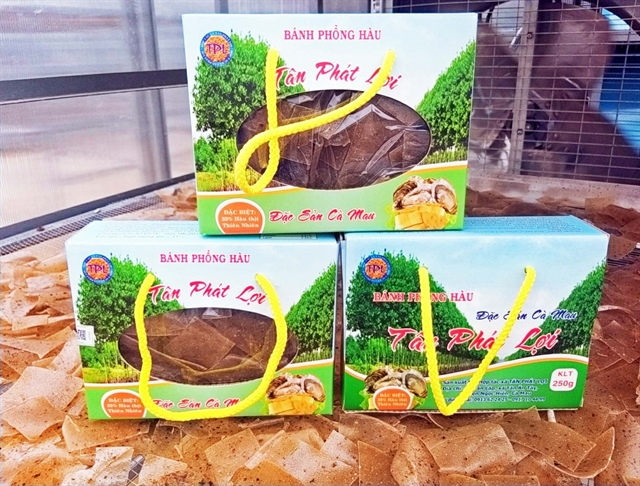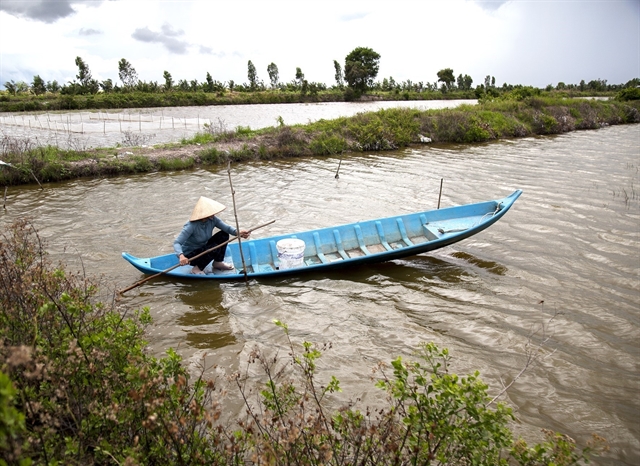 Society
Society


|
| Oyster chips of the Tân Phát Lợi Co-operative in Cà Mau Province’s Ngọc Hiển District have been recognised as a product under the country’s “One Commune – One Product” Programme. — VNA/VNS Photo Huỳnh Anh |
CÀ MAU — Cà Mau Province is boosting the development of a collective economy, especially co-operatives, to promote its potential and strengths for socio-economic development.
Under its plan of developing its collective economy in 2024-30, the southernmost province aims to develop 30 new co-operatives and 100 new co-operative groups next year, focusing on establishing agricultural co-operatives in new-style rural and advanced new-style rural communes.
It targets an average annual income of workers and members of co-operatives of more than VNĐ50 million (US$2,500) in 2025 and for co-operatives to earn average annual revenue of VNĐ1 billion ($40,000).
It aims for about 50 per cent of co-operatives to operate highly effectively and for 30 per cent of co-operative managers have certificates of tertiary education.
It also aims to increase the average co-operative membership from 15 in 2023 to 70 in 2030.
The province is mobilising more than VNĐ726 billion ($29 million) from various sources to implement the plan of developing its collective economy in 2024-30.
Lê Văn Sử, deputy chairman of the province's People’s Committee, said the plan will strengthen the collective economy, especially co-operatives in various sectors, to attract farmers, households, companies and organisations to co-operate and develop production linkages.
The plan will improve State management of the collective economy and create favourable conditions for developing the sector, he said.
The People’s Committee has targeted to develop the collective economy in general and co-operatives in particular in combination with meeting the demands of the market and implementing the national programme of building new-style rural areas and “One Commune - One Product” (OCOP) programme.
The province has more than 1,200 co-operatives and co-operative groups in various sectors.
In the agriculture sector alone, it has 187 co-operatives with more than 3,749 members and 939 co-operative groups.
Up to 77 per cent of its population live in rural areas.

|
| Organic shrimp ponds of the Đoàn Phát Co-operative in Cà Mau Province’s Thới Bình District. The co-operative implements organic shrimp-rice farming. – VNA/VNS Photo Hồng Đạt |
Effective operation
Many co-operatives in Cà Mau have operated effectively and expanded their operations.
The Tân Hưng High Productivity Shrimp Breeding Co-Operative in Cái Nước District has increased its members from 44 to 70 after establishing eight years ago.
The members breed 300ha of shrimp, including 50ha of super-intensive white-legged shrimp farming.
Huỳnh Xuân Diệu, director of the co-operative, said the initial successes of the co-operative are due to many factors, including the assistance of local authorities with advanced breeding techniques.
Water supplied for the co-operative’s shrimp ponds is recycled and reused and this helps reduce production costs, he said, adding that the co-operative can breed four to five shrimp crops a year.
Many co-operatives in the province have average revenue of VNĐ1 billion ($40,000) and a profit of VNĐ300 million ($11,800) a year, according to the province's Co-operative Alliance.
The province has provided financial and other support to develop new co-operatives. These co-operatives have helped promote local specialty products, improving their value and income for local people.
In Đầm Dơi District’s Đầm Dơi Town, the Cà Mau Salt Co-operative was established with six members early this year. The town's People’s Committee granted VNĐ100 million ($4,000) for the co-operative to buy machines and facilities for production.
Tiền Ý Nguyện, director of the co-operative, said: “I see shrimp and salt as two abundant products in the town and I have an idea of producing food made from them to develop their production and increase their value.”
The co-operative specialises in producing products from salt and shrimp such as shrimp salt, red chilli salt, and green chilli salt.
Lê Ngọc Lam, a worker of the co-operative, said: “I have been working for the co-operative since its establishment and my work is packing products. My income is based on my work productivity.”
Trần Quốc Tuấn, deputy chairman of the town's People’s Committee, said the co-operative has directly contributed to reducing poverty in the locality and created jobs for local people in their free time.
“The co-operative is newly established but it secures stable product output and continues improving product quality,” he said.
Co-operatives in the province have increased selling their products, especially those recognised under the OCOP programme, online through websites, social media and e-commerce platforms, and by introducing their products at tourism destinations.
After OCOP products are sold online, their sales have increased by 20 - 30 per cent compared to traditional sales, according to their producers.
The Tân Phát Lợi Co-operative in Ngọc Hiển District’s Tân Ân Tây Commune has set up its website to sell its products made from shrimp such as dried shrimp, shrimp salt, shrimp flake, shrimp chips and fermented sour shrimp.
Bùi Văn Chương, its director, said online sales have helped the co-operative’s OCOP products reach consumers more easily.
The co-operative sells 2-3 tonnes of products a month, with up to 90 per cent of them sold on the website, he said. — VNS




